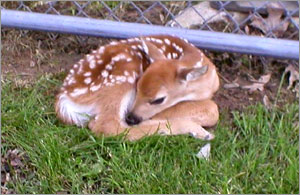I Found a Deer / Fawn

The fawn pictured above does not need help. A fawn in this position is likely waiting for its mother to return.
Find out how to help an injured or orphaned deer.
Unnecessarily removing an animal from its environment – particularly a baby – can cause more harm than simply leaving it be. It is important to recognize signs of distress.
When to Act/Signs of Distress:
- The baby has been crying for an hour or more. (a “maaaappp” sound)
- The baby is injured or has been attacked.
- The baby is lying stretched out and is cold to the touch.
- The baby walks directly up to pets or humans.
- The edges of the ears are curled (dehydrated).
- The baby is in a dangerous place, (lying in water, wandering in the road, parking Lot etc.
- The doe is dead.
- There are flies around the fawn.
Save a Deer: Contact a Wildlife Rehabilitator
Wild Baby Rescue is a member of Animal Rehabilitators Alliance and Garden State Wildlife Rehabilitators Co-op. These organizations have a toll free phone number which provides info on how and when to rescue. Call to get connected with a rehabber who specializes in the species you have found. Staff of a rehabilitation facility can determine whether the animal needs help, and if so, how you can safely transport it to a treatment facility. It is not kind (or legal) to keep wildlife as pets. Let’s work together to keep wildlife wild and free.
1-877-472-8945 (4SAV-WILD)
Blairstown, New Jersey
1-908-362-9453 (WILD)
UPDATE (SPRING 2021): Wild Baby Rescue Center WILL BE OPEN for the Spring 2021. However, due to the current pandemic, there will be some restrictions. We will be receiving orphans directly from several facilities, but we will not be taking wildlife directly from the general public. Please do not bring wildlife here; we will be unable to take it. READ MORE ABOUT OUR CURRENT OPERATIONS.
If you know of an animal who needs help please call as soon as possible. Because time is of the essence do not use email or facebook to ask for help with an animal. (Email and Facebook are for general inquiries only.)
Common Instructions From Wildlife Caregivers:
- Call a licensed wildlife rehabilitator. A professional will be able to recognize if the animal is in distress or not.
- DO NOT FEED A WILD ANIMAL – providing the wrong type of food or drink could cause serious harm.
- If it is necessary to move an injured/abandoned animal:
- Wear gloves when handling wildlife.
- Put the baby in a secure box or pet carrier.
- Provide a heat source for warm-blooded animals (a soda bottle filled with hot water put in a sock, or a sock filled with rice and heated till warm in the microwave are good sources of heat).
- Provide a blanket or towel to snuggle and hide under.
- Keep rescued animals in a dark and quiet place away from pets and children.
